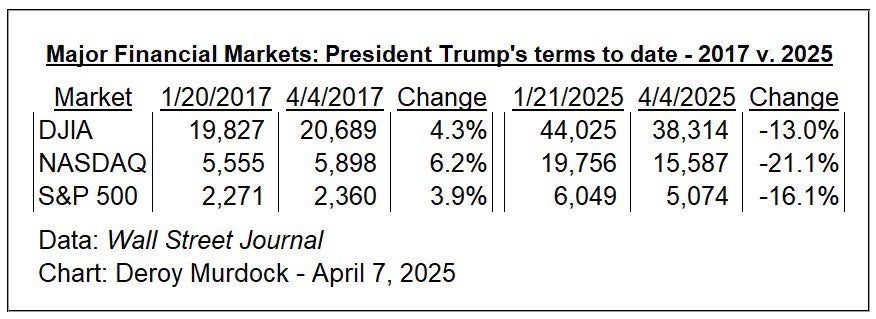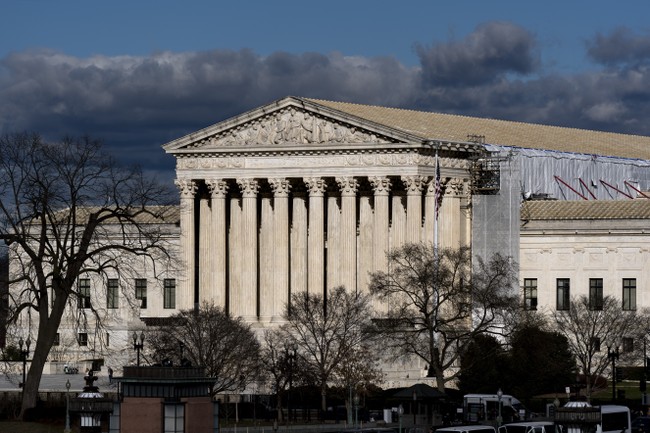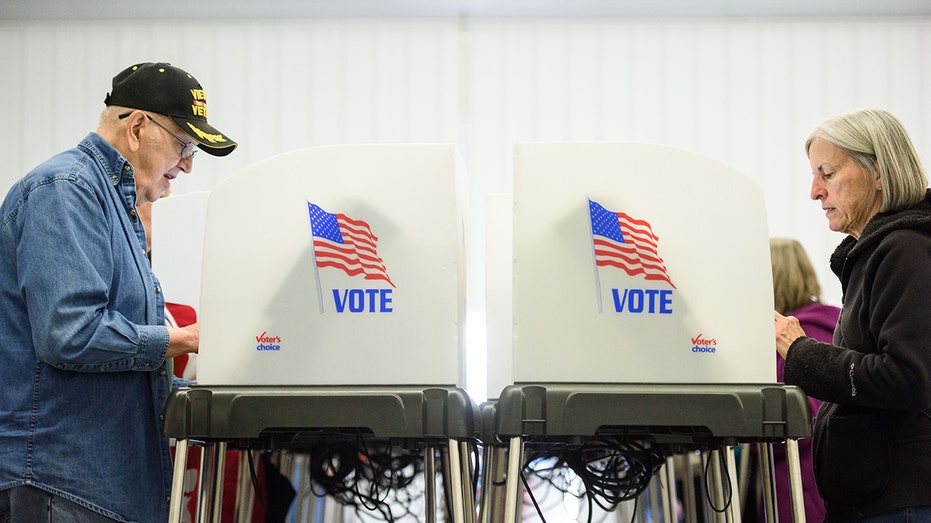More carrots, please.
Feeling flogged by sticks, Wall Street greeted President Donald Trump’s “Liberation Day” with a bellowing Bronx cheer.
On Wednesday, Trump unveiled 10% across-the-board tariffs on all imports, plus reciprocal taxes tailored to foil foreign tariffs on U.S. goods. Financial markets opened Thursday and swiftly wilted.
After China slapped a retaliatory 34% tariff on American products early Friday, the key indexes dropped like bombs from a B-52. The Dow Jones Industrial Average tumbled 2,231 points (5.50%). The S&P 500 plunged 322 points (5.97%). The NASDAQ plummeted 962 points (5.82%).

By this measure, the contrast between Trump-45’s and Trump-47’s early days could not be more stark. While the DJIA rose 4.3% between Jan. 20 and April 4, 2017, it slipped 13% from Jan. 21 to April 4, 2025. The S&P advanced 3.9% for those 2017 dates, but sagged 16.1% in 2025’s like period. NASDAQ’s analogous figures: 2017, up 6.2%; 2025m, down 21.1%.
All told, these exchanges just suffered their worst week since March 2020, just as the curtain rose on America’s COVID-19 catastrophe. Callie Cox, Ritholtz Wealth Management’s chief market strategist, told The Wall Street Journal: “We are in a period of self-induced vomiting.”
Everyday Americans are queasy. The Conference Board’s Consumer Expectations Index fell from 74.8 in February to 65.2 in March—down 12.8% to that metric’s lowest level since 2013.
Such pessimism can make recession jitters a self-fulfilling prophecy.
If Trump wants to impose import taxes on a reciprocal basis, to dragoon countries into lowering them on U.S. goods, fine. Trump also has threatened tariffs to improve behavior abroad. Thus, Canada, Mexico, Colombia, and Venezuela saw the light and now help America seal our borders and export illegal-alien criminals.
Beyond such tactical deployment, however, tariffs are taxes. And taxes are theft.
If the USA must absorb tariffs as long-run expenses (rather than watch Trump use them, short-term, to lean on foreign leaders), they should strike a vibrant, very special economy—like nothing you ever have seen. Instead, tariffs are smacking Americans still anemic from Bidenomics.
Nonetheless, Trump predicted Wednesday in the Rose Garden: “We will supercharge our domestic industrial base.” He pledged, “Jobs and factories will come roaring back into our country,” along with “more production at home.”
Hooray!
But where will companies find the cash to repatriate foreign assembly lines, expand domestic operations, and otherwise reinvigorate U.S. manufacturing—especially after $6.6 trillion in market value evaporated on Thursday and Friday?
Trump’s stick-heavy recipe needs one key ingredient to prevent widespread regurgitation:
Carrots.
The all-American industrial renaissance that Trump rightly envisions would arrive sooner, if lower taxes, instant amortization, and other catalysts were humming within days, not whenever congressional Republicans get around to them.
From twisting arms on Capitol Hill to rallying taxpayers across America, Trump should push tax cuts as hard as he presses tariffs. Indeed, tax cuts should have come first.
What a pity that Trump did not promote these policies in reverse order:
First, slash taxes and let embattled American citizens and companies keep more of their money. A boom promptly would have erupted.
Second, as output soared, Trump should have invited world leaders to the White House and proposed 0% tariffs among these trade partners. If they agreed, Hallelujah! The world would enjoy pure, free trade. The ghosts of Milton Friedman and Adam Smith would weep with joy. Trump could have declared victory and posed for his avatar on Mount Rushmore.
Third, if those countries rebuffed Trump’s offer, however, he then could have hurled reciprocal tariffs like lightning bolts from atop the moral highlands.
Instead, uncertainty remains the enemy of growth. This suggested timetable would have furnished answers, not today’s burning questions:
What tax rate will corporations pay after Jan. 1? How quickly may a factory amortize a brand-new boiler? Will Canadian aluminum prices include a 25%, 10%, or 0% tariff?
As of second quarter 2025, nobody knows.
Type a question mark into a business plan’s spreadsheet. Watch your laptop smolder.
But as question marks yield to clear incentives, the economy will climb.
Congressional Republicans appear to be coalescing around One Big, Beautiful Bill, brimming with permanently low Trump-45 tax rates, a new 15% corporate tax (down from 21%) for domestic manufacturers, and other vital reforms. Alas, Republicans lack the urgency that this moment demands. Senators, in particular, discuss tax cuts by Memorial Day or “later this year.” Others would postpone Trump’s proposed repeal of taxes on tips, overtime, and Social Security benefits until 2026.
That’s dangerous.
Those tax cuts should be passed and signed by May Day, short-sheeting socialists everywhere. Tax relief should take effect that morning, if not retroactively to Jan. 20 or even Jan. 1, 2025. At once, that would leave additional money in American wallets. Businesses would bloom among lower tax rates, more generous deductions, and, ideally, immediate depreciation for factory construction and equipment.
A burgeoning economy would position Republicans to keep Congress. However, GOP dithering on tax reduction could delay prosperity and buoy Democrats’ midterm prospects.
A House Speaker Hakeem Jeffries, D-N.Y., would wield a three-item to-do list: Strangle the America First agenda, repeatedly impeach Trump, and enact the Democrat version of MAGA: Make Abortion Great Again.
Meanwhile, some Republicans reportedly are considering hiking tax rates up to 40% on $1-million-plus earners. It is abominable that any Republican would parrot Sen. Bernie Sanders’ chief talking point: Tax millionaires and billionaires—good and hard.
No, no, no. Hell, no!
God created Republicans to cut taxes, not raise them—especially when the GOP controls the House, Senate, and Oval Office.
What the hell are these boneheads thinking?
Every Republican who even whispers such apostasy should become a pillar of salt.
For better or worse, Trump’s tariffs are no surprise. Promise made. Promise kept.
That policy also is an audacious wager.
Best-case scenario: Scores of nations mirror Israel’s and Vietnam’s ambitions to negotiate with Trump and set reciprocal tariffs at 0%. Goods and services would traverse borders as freely as phone calls and love letters.
Worst-case scenario: Trade War I explodes, nations dig financial trenches, and attack each other with tariff gas. Impoverished Americans would wander through a Weimaresque fog and eventually seek a new leader to restore our former glory.
Mr. President, let’s avoid that second destination.
More carrots, please!

President Donald Trump should offer the economy more carrots and fewer sticks, says commentator Deroy Murdock. (Sheila Sund/Wikimedia Commons)
We publish a variety of perspectives. Nothing written here is to be construed as representing the views of The Daily Signal.
The post As Tariffs Tank Markets, Economy Craves Tax Cuts appeared first on The Daily Signal.
.png)















 English (US)
English (US)